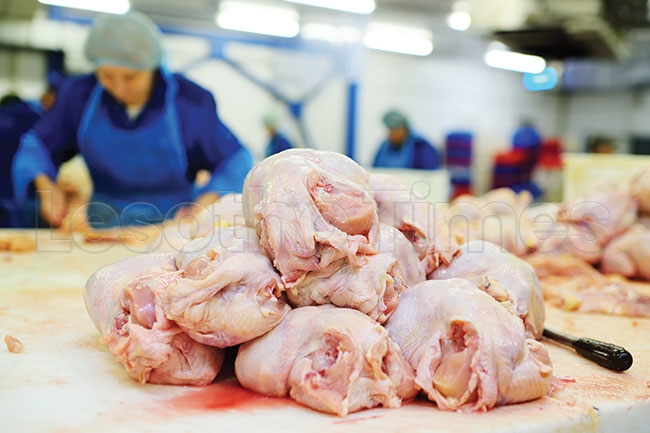Seithati Motsoeneng
RETAILERS and restaurants in Lesotho have been forced to issue notices advicing consumers of the lack of chicken products in their outlets while others have already temporarily closed shop.
The absence of chicken and its byproducts in retail outlets is the snowball effect of the government’s decision to impose a ban on chicken imports, following the outbreak of Avian Influenza in South Africa in June this year.
The Minister of Agriculture, Food Security and Nutrition, Thabo Mofosi, imposed the ban, saying this was aimed at saving Basotho from the possible risk of infections.
Most of the chickens and chicken products consumed in Lesotho are imported from South Africa.
Outbreaks of the influenza A(H7N6) have been recorded in South Africa since June 2023. Since then, 50 outbreaks have been reported in poultry farms in Free State, Gauteng, Mpumalanga, Limpopo, North West and KwaZulu-Natal provinces and non-poultry birds in Gauteng.
While the popular fried chicken franchise, KFC has already temporarily closed its doors to customers as a result of the ban, another famous fried chicken outlet, Crispy King, says it will close shop by the end of this week due to the lack of chicken.
Speaking to the Lesotho Times this week, Crispy King Manager, Lemohang Moshesha, said: “The issue of poultry imports ban has really hit us hard because we cannot access our supplier in South Africa, and it is only now that we are in search of new suppliers locally to save our business.”
Moshesha said this should be a wake-up call to Basotho to have sustainable local suppliers of chicken to avoid a similar predicament in the future.
He further expressed concern that closing shop, albeit temporarily, could potentially cause them to lose their customers’ trust “which we have earned over time”.
KFC, which stocks its chicken exclusively from South Africa, has also run out of stock leading to last week’s closure of the franchise’s restaurants accross the country.
“Our supply chain has been severely impacted due to unexpected government regulations, we are sorry, but all our Lesotho restaurants will be temporarily closed,” KFC said in a statement.
Retailers, Pick n’ Pay and Shoprite, have not been spared the effects of the ban either. They have also notified their customers about the shortage of poultry products in their outlets.
While neither the Shoprite nor Pick n’ Pay management would issue a comment, general manager of another retail outlet, Econo Foods, Katleho Moshesha, told the Lesotho Times yesterday, that depending on demand, their current stock could only last for a week.
“After that it is a waiting game for all, at least until the ban has been lifted so we can access our suppliers in South Africa,” Mr Moshesha said.
An estimated 2.1 billion chickens are imported into the country per annum which makes Lesotho prone to poultry shortage if supplies from South Africa are disrupted as in the current situation.
This state of affairs also speaks to the glaring lack of an entreprenurial flare in the country. Most countries of the world are at least able to breed business people capable of producing chicken and eggs for consumption within their borders.

